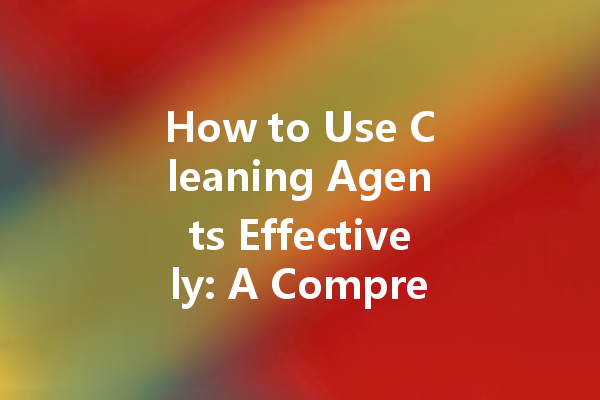Cleaning agents are essential tools in our everyday lives, enabling us to maintain cleanliness and hygiene in various environments. However, not all cleaning agents are created equal, and their effectiveness often hinges on how they are used. This guide provides insights into the proper usage of cleaning agents, ensuring you maximize their benefits while remaining safe and efficient.
Understanding Cleaning Agents
What Are Cleaning Agents?
Cleaning agents, also known as cleaning products, are substances used to remove dirt, stains, and contaminants from various surfaces. They can be categorized into several types, including detergents, disinfectants, solvents, and abrasives. Each type serves a specific purpose and is formulated to tackle different kinds of messes.
The Importance of Choosing the Right Cleaning Agent
Selecting the appropriate cleaning agent for a specific task is crucial. Using the wrong product can lead to ineffective cleaning and, in some cases, damage to surfaces. For instance, acidic cleaners are effective for descaling, while alkaline cleaners work well for grease removal. Familiarizing yourself with various cleaning agents will aid in making informed choices.
How to Use Common Cleaning Agents
All-Purpose Cleaners
All-purpose cleaners are versatile products suitable for most surfaces, including countertops, tables, and floors. To use an all-purpose cleaner, spray it directly onto the surface and wipe it down with a clean, dry cloth. For heavier grime, allow the cleaner to sit for a few minutes before wiping it away.
Bathroom Cleaners
Bathroom cleaners are designed to tackle tough stains and residues, particularly in showers, sinks, and toilets. When using bathroom cleaners, apply the product generously to affected areas and let it sit for the recommended dwell time on the label, usually around 10-15 minutes. This allows the cleaner to break down soap scum and mildew effectively.
Glass Cleaners

To achieve streak-free shine on glass surfaces, consider using a dedicated glass cleaner. Spray the cleaner onto the glass and wipe it with a microfiber cloth or paper towel in a circular motion. Avoid cleaning glass when it’s hot, as this can cause streaks.
Degreasers
Degreasers are particularly effective for removing oily and greasy residues, making them ideal for kitchens and garages. To use a degreaser, apply it directly to the oily area and allow it to penetrate for a few minutes. Then, scrub the surface with a sponge or brush before rinsing with water.
Safety Tips When Using Cleaning Agents
Read the Labels
Before using any cleaning agent, it’s essential to read the labels thoroughly. Labels provide information on proper usage, dilution ratios, and safety precautions. Following these instructions can prevent accidents and ensure optimal cleaning results.
Use Protective Gear
Some cleaning agents may contain harsh chemicals that can irritate the skin or respiratory system. When using these products, consider wearing gloves, masks, and goggles to protect yourself. Ventilating the area while cleaning is also advised.
Store Cleaning Agents Safely
To prevent accidental misuse or poisoning, store cleaning agents out of reach of children and pets. Ensure that all bottles are securely capped and labeled. Additionally, avoid mixing different cleaning agents, as chemical reactions can create harmful fumes.
Conclusion
Using cleaning agents effectively can enhance your cleaning routine, making it easier to maintain a spotless environment. By understanding the different types of cleaning agents and following best practices for their usage and safety, you can tackle any mess with confidence. Always remember that the key to effective cleaning lies in choosing the right product for the job, using it as directed, and taking necessary safety precautions. Cleanliness is not just a necessity; it’s a pathway to a healthier and more pleasant living space.
